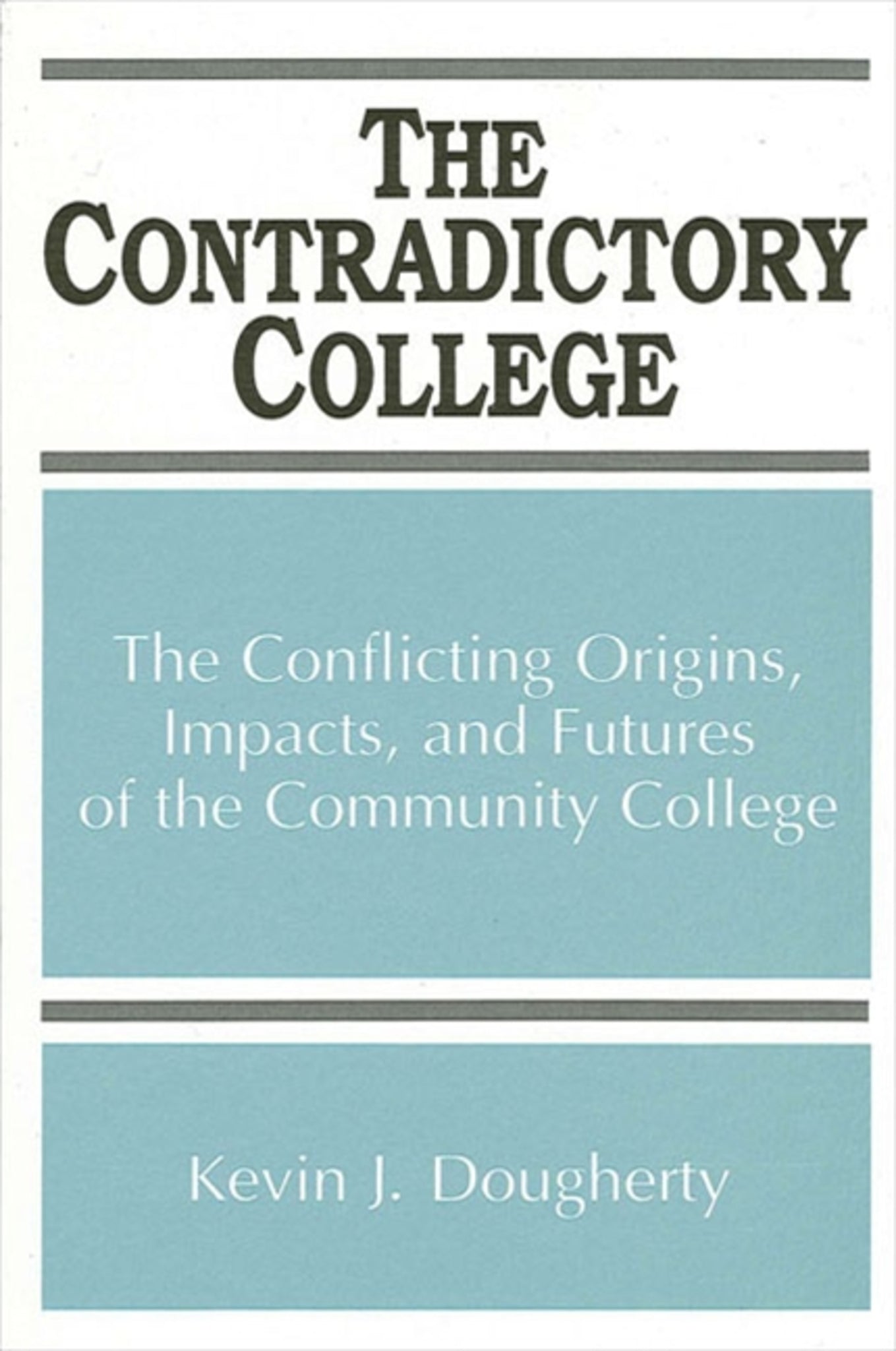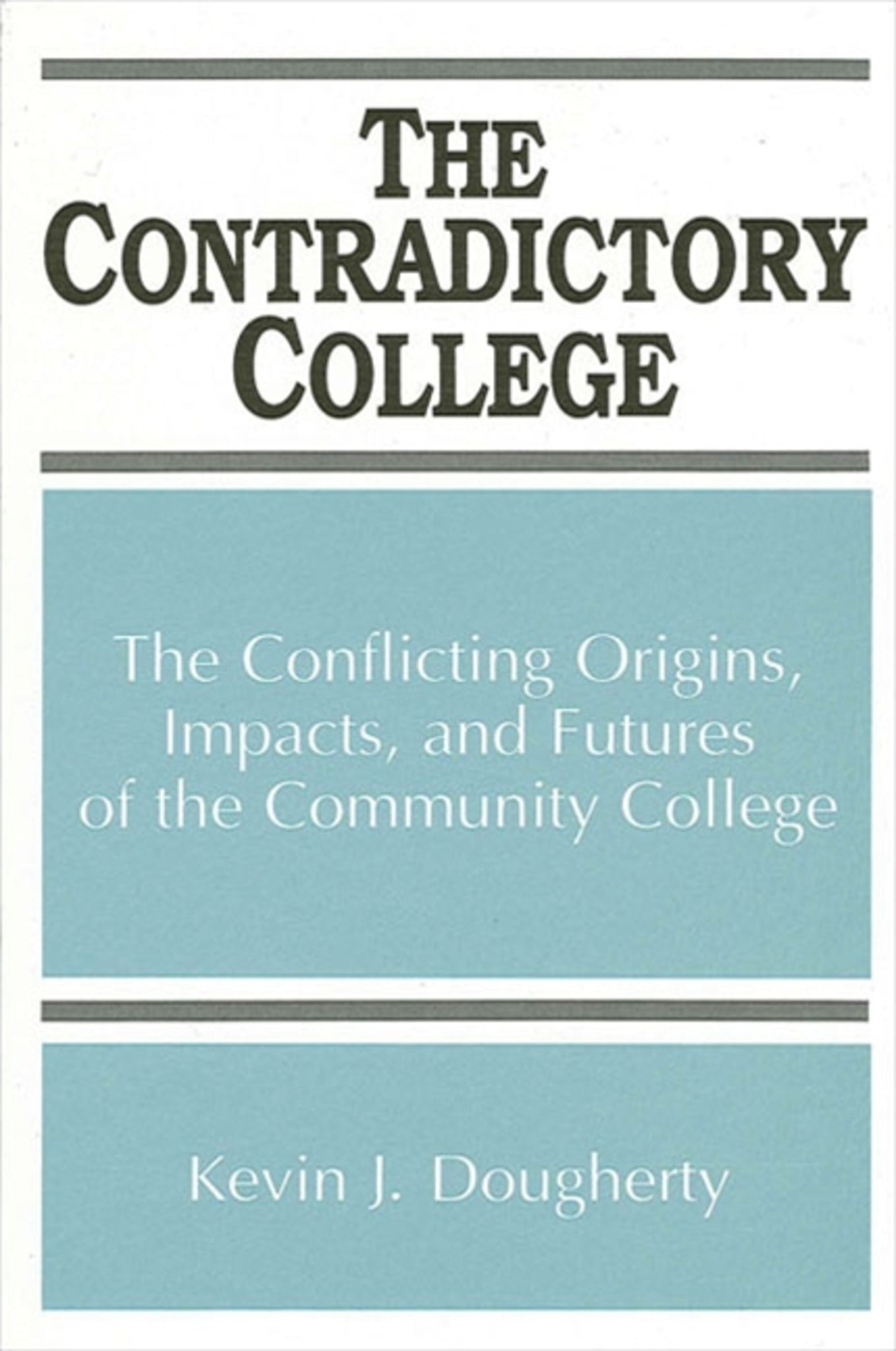We're sorry. An error has occurred
Please cancel or retry.
The Contradictory College

Some error occured while loading the Quick View. Please close the Quick View and try reloading the page.
Couldn't load pickup availability
- Format:
-
01 July 1994

This book systematically analyzes the evidence on four key issues that have divided commentators on the community college: The community college's impact on students, business, and the universities; the factors behind its rise since 1900; the causes of its swift vocationalization after 1960; and what direction the community college should take in the future.


"In this comprehensive and brilliantly lucid book, Kevin Dougherty considers competing ideas about the community colleges—ideas offered by functionalist advocates, instrumentalist Marxist critics, and institutionalist critics. In offering his own perspective, he sheds new light on the issues. He analyzes how various outcomes occur, identifies an important additional set of players, namely government officials, and specifies how business constrains actions by those officials. The book is essential reading for educational administrators and policy-makers, sociologists of education, political sociologists, and everyone concerned with equal educational opportunity." — Caroline Hodges Persell, New York University
"Dougherty's The Contradictory College is one of the most important books in the sociology of higher education to appear in the past decade. His distinctive theoretical perspective, applied in careful case studies of the important states of California, Washington, Illinois and New York, sheds critical new light on the development of the community college over the past century. This is a sophisticated and challenging work that should be of interest not only to students of education, but also to those who are interested in the politics of organizational choice." — Jerome Karabel, University of California at Berkeley
"With the publication of The Contradictory College Kevin Dougherty solidifies his membership in the ranks of the most thoughtful and important scholars of the American community college. This book is a major scholarly achievement that will stand the test of time to be considered one of the significant works on the topic. It should be read by everyone concerned about the welfare and future of the community college." — Ernest Pascarella, The University of Illinois at Chicago
"Kevin Dougherty has written an important book that brings new data and new insights on the development and functions of the community college. He demonstrates that debates over state theory have profound relevance for analyzing educational policy. This book makes a provocative contribution to our understanding of how power works in this society." — Fred Block, University of California at Davis
"Whenever Kevin Dougherty writes about the community college, it behooves us to pay close attention. Professor Dougherty is among the most thoughtful, careful, and challenging thinkers examining the educational, economic, and social role of the community college." — Judith S. Eaton, Council for Aid to Education
Acknowledgments
Section I: Introduction
1: The Community College's Importance and Controversiality
The Debate over the Community College
The Aims of This Book
The Content of the Chapters
2: The Debate Deepened
The Debate over the Effects of the Community College
The Debate over Why Community Colleges Were Established
The Debate over Why Community Colleges Were Vocationalized
Summary and Conclusions
Section II: Outcomes
3: The Community College's Impact on Students, the Economy, and the Universities
The Impact on Business and the Economy
The Impact on the Elite State Universities
The Effects on Students
Access to Higher Education
Educational Attainment
Economic Attainment
Summary and Conclusions
4: How Does the Community College Hinder Baccalaureate Attainment?
Attrition in the Freshman and Sophomore Years
Failure to Transfer to Four-Year Colleges
Attrition after Transfer
Summary and Conclusions
Section III: The Origins and Expansion of the Community College
5: The Founding of Community Colleges:Introduction
The Stages of Community College Growth
Studying the Founding of Community Colleges
Explaining Community College Expansion
6: Local-Level Institution Building: The Centrality of Local Educators
Private Interest Group Pressure Was Not the Main Cause
The Key Role of Local School Officials and Other Educators
7: State-Level Advocates: The Interests of Governors and State University Officials
How Involved Were Nongovernmental Actors?
Government Agencies and Officials Weigh In
8: National-Level Reinforcement of Local and State Initiatives
The Limited Impact of Private Interest Group Pressure
Governmental Initiative
9: The Politics of Community College Founding: Summary and Conclusions
Convergences and Divergences with the Institutional Perspective
From Diverse Origins to Contradictory Effects
Explaining the Homogeneity of Community College Expansion
Section IV: The Origins of Occupational Education
10: The Vocationalization of the Community College: Introduction
The Timing of Occupational-Education Development
Studying the Process of Vocationalization
Explaining the Expansion of Occupational Education
11: Local-Level Vocationalization: Community College Heads as Vocational Entrepreneurs
Business and Student Demand Are an Insufficient Explanation
Community College Officials Take the Lead
12: State Governors and Legislators Discover Occupational Education
Business and Student Pressure Are Not the Explanation
The Interests of Government Officials
13: National-Level Support for Vocationalization
Governmental Initiative
The Limited Impact of Private Pressure
14: The Politics of Vocationalization: Summary and Conclusions
Convergences and Divergences with the Institutional Perspective
Section V: Implications of the Research
15: From Research to Practice: The Policy Implications of the Community College's Impact on Students
The Noncollegiate Program
The Reforms Detailed Evaluation: These Reforms Would Exacerbate the Problem
Hindering Baccalaureate Aspirants
Gutting General Education
The Collegiate Program
The Collegiate Reforms Detailed
Reducing Attrition in the Lower Division
Increasing the Transfer Rate
Reducing Post-Transfer Attrition
Evaluation: These Reforms Are Necessary but Insufficient
Structural Reform
Transforming Community Colleges into Four-Year Colleges
Converting Community Colleges into State University Branches
Summary and Conclusions
16: From Research to Theory: Implications for Educational History and Politics and Political Sociology
Educational Change
Politics of Education
Political Sociology
Conclusion
Notes
References
Index



